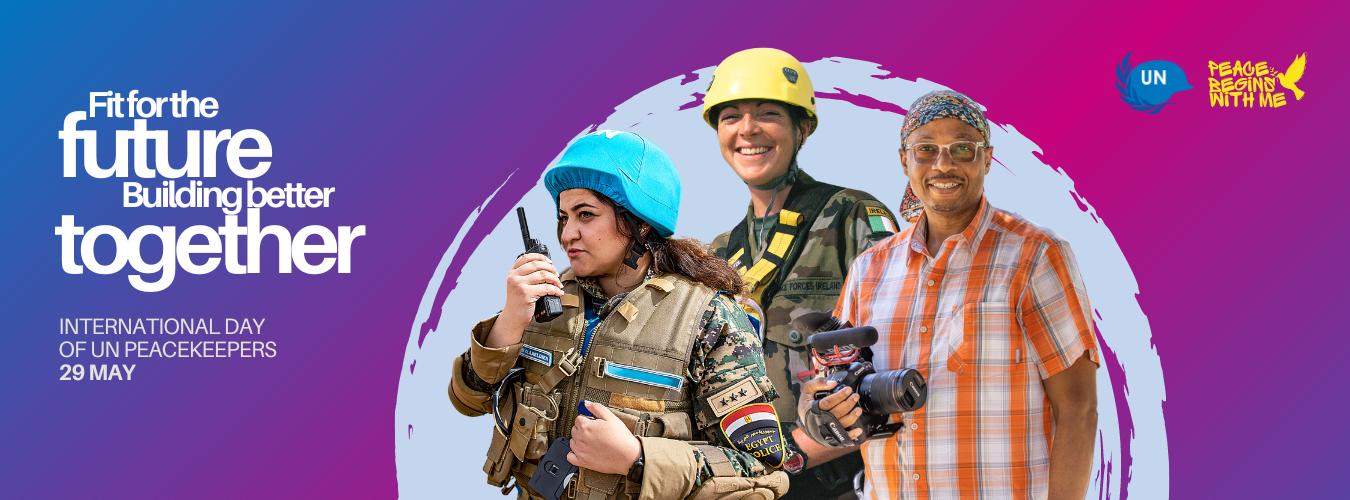Khalid Masood Khan
On the International Day of UN Peacekeepers, we pay tribute to the invaluable contributions of military, police, and civilian personnel who have dedicated themselves to peacekeeping missions worldwide. This day serves as a moment to honour their unwavering commitment, celebrate their achievements, and acknowledge the sacrifices made in the pursuit of global peace and security. The theme “Fit for the future, building better together” encapsulates the spirit of progress and collaboration, highlighting the ongoing efforts to create a more just and sustainable world. This year, we also recognize the pivotal role of gender parity in empowering peacekeeping operations and fostering more effective missions.
The United Nations peacekeeping operations have been instrumental in saving and transforming lives in some of the world’s most fragile political and security environments for over 76 years. Since 1948, over two million uniformed and civilian personnel have been deployed to assist nations in transitioning from conflict to peace. Presently, more than 70,000 peacekeepers are serving in 11 missions across global hotspots.
Under the theme “Fit for the future, building better together,” this year’s International Day commemorates the significant contributions made by military, police, and civilian peacekeepers over the past seven decades. It embodies the spirit of progress and collaborative efforts aimed at creating a more equitable, just, and sustainable world.
Peacekeeping has continually adapted to the evolving political landscape and the increasingly complex and interconnected nature of conflicts. With the support of UN member countries, peacekeeping efforts align with the UN Secretary-General’s New Agenda for Peace, which advocates for a more comprehensive and collective approach to addressing today’s and tomorrow’s security threats.
Despite the myriad challenges, peacekeepers, in partnership with various stakeholders, persist in their collective pursuit of peace. The International Day serves as a tribute to the dedication and sacrifices of peacekeepers, as well as the resilience of the communities they serve. It also honors the memory of over 4,000 peacekeepers who have lost their lives in the service of peace.
This campaign also encourages individuals to join the global peace movement, recognizing that true success can only be achieved through collective action. Together, we can become a formidable force for positive change.
As peacekeeping has evolved to better reflect the populations it serves, the inclusion of women in peacekeeping operations has become increasingly important, leading to more effective missions. Women, with their unwavering bravery and resilience, are now deployed in various roles within peacekeeping, including police, military, and civilian positions. Their presence has had a profound and positive impact on peacekeeping environments, playing a crucial role in supporting the participation of women in peacebuilding efforts and in safeguarding women’s rights.
Women peacekeepers have demonstrated their ability to perform the same duties as their male counterparts at the same standards, even in challenging conditions. It is essential for peacekeeping operations to recruit and retain female peacekeepers as part of their operational imperative.
In 1993, women accounted for only 1% of deployed uniformed personnel. However, by 2020, the percentage of women in peacekeeping operations had significantly increased, with women constituting 4.8% of military contingents, 10.9% of formed police units, and 34% of justice and corrections government-provided personnel in UN Peacekeeping missions. This progress, while encouraging, is just the beginning. The UN encourages the deployment of women to uniformed functions, and the responsibility for such deployments lies with Member States, signaling a collective commitment to gender parity in peacekeeping.
The UN has launched various initiatives to promote the recruitment of female peacekeepers, setting targets for the representation of women in military contingents, formed police units, and individual police officer positions. The organization is committed to increasing the number of women serving in peacekeeping missions and provides gender statistics to track the progress of these efforts.
Women peacekeepers bring unique perspectives and skills to peacekeeping operations, leading to more effective missions. Their presence improves overall performance, enhances access to communities, promotes human rights, protects civilians, and encourages women’s active engagement in peace and political processes. They also play a crucial role in building trust and confidence within local communities, contributing significantly to conflict prevention and reduction.
The Department of Peace Operations has implemented key initiatives to advance gender parity, such as requiring Member States to nominate a minimum percentage of women for various positions within peacekeeping operations, prioritizing the deployment of qualified women personnel, and promoting the inclusion of women in leadership positions. These efforts are aligned with the UN Security Council resolution 1325 and the Action for Peacekeeping (A4P) initiative, which emphasize the importance of women’s participation in peacekeeping operations.
The Action for Peacekeeping (A4P) initiative, supported by 152 Member States, recognizes the Women, Peace, and Security agenda as critical to enhancing peacekeeping operations’ performance. It calls for the increased participation of women in peacekeeping at all levels and in key positions. Member States are urged to actively support gender parity in peacekeeping by ensuring that information on deployment opportunities reaches decision-makers and women officers, recruiting and training more women in national services, and nominating and deploying women to UN peace operations in line with gender parity targets.
The contribution of women peacekeepers is celebrated through initiatives such as the Military Gender Advocate of the Year Award, which recognizes individuals who have made significant strides in promoting gender equality in peacekeeping. Major Winnet Zharare, a Zimbabwean Chief Military Information Officer, received this prestigious award for her outstanding contributions to UN peacekeeping operations.
To encourage engagement and dialogue on this important issue, social media platforms are utilized to share content and campaign materials, including GIFs, infographics, and videos. The hashtag #womeninpeacekeeping is used to facilitate conversations and specific campaign materials are made available for sharing and reposting.
In conclusion, women’s participation in peacekeeping operations is crucial for enhancing the effectiveness, inclusivity, and impact of these missions. Through ongoing efforts and initiatives, the UN and Member States are working together to promote gender parity and ensure the meaningful participation of women in peacekeeping, ultimately contributing to a more peaceful and secure world.
















